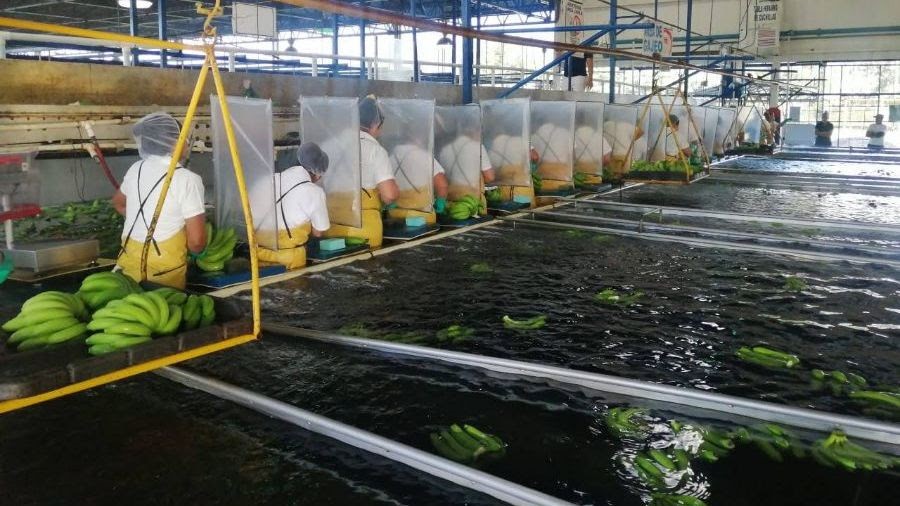Farmers and workers of some of the world’s biggest crops are facing a “humanitarian crisis” as a result of the Covid-19 pandemic as supply chains stall and prices drop dramatically.
Staple crops in developing countries, such as bananas and tea, are facing in some cases huge drops in demand, problems with getting crops to ports, and a lack of labour for harvesting due to worker absences.
There are also more direct fears over coronavirus: the rural locations in developing countries where many of these crops are produced lack access to basic health care, clean water, cleaning products, and PPE.

The situation has prompted the Fairtrade Foundation, which works with 1.71 million Fairtrade workers in 73 countries, to warn of a “humanitarian crisis”, and the UN’s Food and Agricultural Organization (FAO) to say global food security is at risk.
“In developing countries, [producers] are already in crisis in so many ways, so this will just push them over the edge,” says Susannah Henty, senior comms manager at the Foundation.
Pascal Liu of FAO’s Responsible Global Value Chains team, adds: “In many of these countries, low saving rates and limited access to credit severely impede people’s ability to cope with economic shocks. The length of the current crisis and uncertain outlook further amplify risks to the income of farmers and farm workers.”
Banana exports hampered by pandemic
Bananas are generally reaching markets, but there have been problems getting bananas to port, finding shipping containers, and packing plants have slowed due to worker distancing.
The port city of Guayaquil in Ecuador, the world’s biggest banana exporter, is one of the worst pandemic-hit areas in Latin America. “Some truck drivers don’t want to drive to Guayaquil,” says Anna Pierides, Fairtrade banana supply chain manager.
“But the concerns are more long term,” she says, “These factors increase the cost of production for farmers. We still don’t know the damage in each region, but people’s livelihoods are at risk.”

Fairtrade-certified Ecuadorian banana grower, Henry Fernandez Guerrero, has had to invest in PPE, and additional disinfection and handwashing stations.
“The impacts are economic and human,” he says. “Small farmers and workers are committed to producing food, but they receive less every day for the exported fruit. This disease will remain for a long time, so we’ll have to adapt to survive until a cure is found.”
Lack of safety net threatens coffee
Despite coffee-shop closures, demand seems stable for now. But the coffee market is volatile and there could be a time lag, warns Becky Forecast, Fairtrade coffee supply chain manager.
60 per cent of the crop in Latin America is still to be harvested, so if restrictions prevent pickers getting to farms, the crop could rot in the fields.
“Even if the coffee is harvested, there is the challenge of exporting it,” says Forecast. “Currently, there is a shortage of shipping containers in Brazil and Peru, and many countries have closed their borders including ports.
“Coffee farmers have few safety nets. Prices for coffee are currently very low, well below the cost of production [for many] which means families are struggling to survive. Health wise, Covid-19 is a risk to coffee growing farmers who often live in remote areas with limited access to healthcare,” she adds.
Fragile cacao sector sees prices drop
Cacao provides a livelihood to 40-50m people in developing countries. But the majority is grown by small farmers and workers living in extreme poverty in West Africa.
“There is a growing concern about the health risk [from Covid-19] for cocoa farming communities, who have a high rate of pre-existing health conditions resulting from poverty and poor nutrition as well as a lack of adequate healthcare,” says the Fairtrade Foundation.
The pandemic has caused cacao prices to drop 25 per cent, but for many, the coronavirus is yet another stressor to a precarious situation, says the FAO. West Africa and the Sahel region are currently hit by chronic hunger, insecurity, climate change, and the threat of a Desert Locust outbreak.
Flower market ‘devastated’
The market for cut flowers has fallen off a cliff, as people stop buying non-essential items, weddings have been cancelled, and florists closed.
The biggest exporters, in Ecuador and Kenya, have been “completely devastated”, says Anna Barker, flower senior supply chain manager, at the Fairtrade Foundation.

In Kenya, where the sector supports over 4m livelihoods, sales are down 80 per cent, and at least 50,000 workers have been dismissed or sent homes without pay, with 70,000 on leave.
Charity Opon, human resources manager at Bigot Farms in Kenya, says they have had to dump 9.8m rose stems since mid-March. “It’s heartbreaking,” she says.
The farm is rotating its 1,070 workers, with 50 per cent on annual leave at any one time, and using its savings to maintain full pay. But by June, annual leave will have to be unpaid. They plan to use Fairtrade premiums to buy food for workers.
The long-term effect
For now, farms certified by Fairtrade are dipping into saved up ‘premiums’ (additional money paid on top of the Fairtrade minimum price), and these reserves are proving vital, with many choosing to spend them on emergency food parcels, coronavirus testing kits, soap, PPE, and even retrain workers to make masks.
These premiums will run out though, warns the Foundation, if markets and supply chains don’t return to normal soon, and could leave millions at risk of hunger.
And for the majority of the world’s small farmers and farm workers in developing countries who don’t have this extra cash or the Fairtrade cushion to fall back on, the situation is even more precarious.
While the health crisis of coronavirus may be over its worst, it’s clear that its effects on those who rely on global trade, in food and other commodities, are only just beginning.












0 Comments